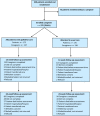Effects of Early Integrated Palliative Care on Caregivers of Patients with Lung and Gastrointestinal Cancer: A Randomized Clinical Trial
- PMID: 28894017
- PMCID: PMC5728034
- DOI: 10.1634/theoncologist.2017-0227
Effects of Early Integrated Palliative Care on Caregivers of Patients with Lung and Gastrointestinal Cancer: A Randomized Clinical Trial
Abstract
Background: The family and friends (caregivers) of patients with advanced cancer often experience tremendous distress. Although early integrated palliative care (PC) has been shown to improve patient-reported quality of life (QOL) and mood, its effects on caregivers' outcomes is currently unknown.
Materials and methods: We conducted a randomized trial of early PC integrated with oncology care versus oncology care alone for patients who were newly diagnosed with incurable lung and noncolorectal gastrointestinal cancers and their caregivers. The early PC intervention focused on addressing the needs of both patients and their caregivers. Eligible caregivers were family or friends who would likely accompany patients to clinic visits. The intervention entailed at least monthly patient visits with PC from the time of diagnosis. Caregivers were encouraged, but not required, to attend the palliative care visits. We used the Hospital Anxiety and Depression Scale (HADS) and Medical Health Outcomes Survey Short-Form to assess caregiver mood and QOL.
Results: Two hundred seventy-five caregivers (intervention n = 137; control n = 138) of the 350 patients participated. The intervention led to improvement in caregivers' total distress (HADS-total adjusted mean difference = -1.45, 95% confidence interval [CI] -2.76 to -0.15, p = .029), depression subscale (HADS-depression adjusted mean difference = -0.71, 95% CI -1.38 to -0.05, p = .036), but not anxiety subscale or QOL at week 12. There were no differences in caregivers' outcomes at week 24. A terminal decline analysis showed significant intervention effects on caregivers' total distress (HADS-total), with effects on both the anxiety and depression subscales at 3 and 6 months before patient death.
Conclusion: Early involvement of PC for patients with newly diagnosed lung and gastrointestinal cancers leads to improvement in caregivers' psychological symptoms. This work demonstrates that the benefits of early, integrated PC models in oncology care extend beyond patient outcomes and positively impact the experience of caregivers.
Implications for practice: Early involvement of palliative care for patients with newly diagnosed lung and gastrointestinal cancers leads to improvement in caregivers' psychological symptoms. The findings of this trial demonstrate that the benefits of the early, integrated palliative care model in oncology care extend beyond patient outcomes and positively impact the experience of caregivers. These findings contribute novel data to the growing evidence base supporting the benefits of integrating palliative care earlier in the course of disease for patients with advanced cancer and their caregivers.
Keywords: Caregiver; Caregiver depression; Distress; Palliative care; Quality of life.
© AlphaMed Press 2017.
Conflict of interest statement
Disclosures of potential conflicts of interest may be found at the end of this article.
Comment in
-
Early Integrated Palliative Care and Reduced Emotional Distress in Cancer Caregivers: Reaching the "Hidden Patients".Oncologist. 2017 Dec;22(12):1419-1420. doi: 10.1634/theoncologist.2017-0432. Epub 2017 Oct 5. Oncologist. 2017. PMID: 28982800 Free PMC article.
References
-
- Northouse L, Williams AL, Given B et al. Psychosocial care for family caregivers of patients with cancer. J Clin Oncol 2012;30:1227–1234. - PubMed
-
- Blum K, Sherman DW. Understanding the experience of caregivers: A focus on transitions. Semin Oncol Nurs 2010;26:243–258. - PubMed
-
- Hudson P. Positive aspects and challenges associated with caring for a dying relative at home. Int J Palliat Nurs 2004;10:58–65; discussion 65. - PubMed
-
- Proot IM, Abu‐Saad HH, ter Meulen RH et al. The needs of terminally ill patients at home: Directing one's life, health and things related to beloved others. Palliat Med 2004;18:53–61. - PubMed
Publication types
MeSH terms
Grants and funding
LinkOut - more resources
Full Text Sources
Other Literature Sources
Medical


